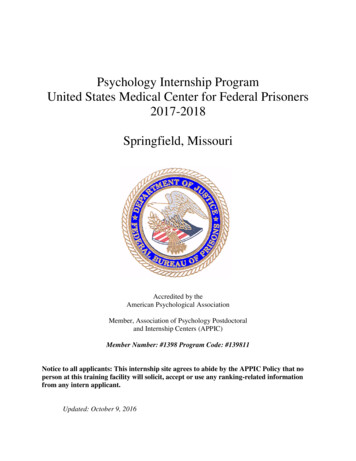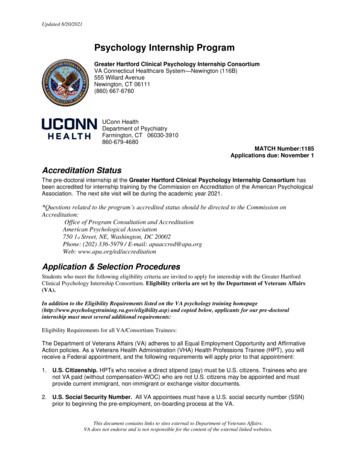
Transcription
Psychology Internship ProgramUnited States Medical Center for Federal Prisoners2017-2018Springfield, MissouriAccredited by theAmerican Psychological AssociationMember, Association of Psychology Postdoctoraland Internship Centers (APPIC)Member Number: #1398 Program Code: #139811Notice to all applicants: This internship site agrees to abide by the APPIC Policy that noperson at this training facility will solicit, accept or use any ranking-related informationfrom any intern applicant.Updated: October 9, 2016
Table of ContentsPhilosophy and Objectives1Overview of the Federal Bureau of Prisons2Psychology Services in the Bureau of Prisons3The BOP Psychology Internship Program: An Overview4The U.S. Medical Center for Federal Prisoners: Our Mission6Psychology Services at the U.S. Medical Center7Description of the U.S. Medical Center Internship Program8Description of Internship Rotations10Research13Eligibility and Application Procedures14Compensation and Benefits16AppendicesA. Psychology Staff17B. Sample Didactic Seminar Topics22C. Employment Opportunities in the Bureau of Prisons23D. Past and Current Interns24E. Springfield and Surrounding Area28
Philosophy and ObjectivesWe are delighted that you are considering the U.S. Medical Center for Federal Prisoners as apotential internship for the upcoming internship year. Our internship program at the U.S.Medical Center seeks to foster the professional and personal growth of each intern. The programis structured to provide certain core experiences to each intern, yet is sufficiently flexible that thetraining experience is individualized to provide learning opportunities in areas of special interest.Although each intern completes all rotations, we request input from the intern in selectingtraining experiences designed for the intern’s specific training needs.The internship year at the U.S. MedicalCenter permits each intern to practicepreviously learned skills and developnew clinical skills under the supervisionof a variety of experienced psychologistsrepresenting a diversity of professionalorientations. Our psychologists adhereto a scientist-practitioner model ofsupervision with our primary goal beingthe training of general adultpractitioners. The internship experiencefosters the improvement and acquisitionU.S. Medical Center for Federal Prisonersof traditional skills in assessment andpsychotherapy with a broad spectrum ofpatients. Interns collaborate with a variety of professional disciplines and develop increasingsensitivity to ethical and cultural issues.Because the training experience is primarily within a hospital-correctional setting, it has adecidedly forensic orientation and would be of particular interest to predoctoral applicants with aburgeoning interest in forensic or correctional psychology. The internship program prepareseach aspiring psychologist for a broad range of future employment opportunities, particularlythose seeking future employment in a correctional setting. We are looking forward to receivingyour application.Please contact me if you have any questions, and good luck with your application process.Elizabeth Tyner, Ph.D.Internship Program Coordinatoretyner@bop.gov(417) 862-7041, ext. 11241
Overview of the Federal Bureau of PrisonsFor over 80 years, the Federal Bureau of Prisons (the Bureau) has been housing federal inmates.In September 2016, Bureau institutions housed approximately 192,600 federal prisoners. Mostof these individuals are serving sentences for offenses involving weapons, illegal drugs, or bankrobbery, but a variety of other crimes against persons or property are represented among theprison population, including “white collar” crimes, such as embezzlement, bank and credit cardfraud, and securities violations.Inmates convicted of the most serious offenses, and those whose institutional adjustment is poor,are housed in maximum security settings, or penitentiaries. Most inmates live in medium or lowsecurity institutions affording greater degreesof personal freedom. Most facilities have inhouse support services, including Medicaland Psychology Departments. However, theBureau maintains a series of “medicalreferral centers” to provide for prisonerswhose needs cannot be adequately addressedin general population settings. The U.S.Medical Center is a medical referral center.Male and female inmates are diverse in theircultural orientations, educational levels,mental conditions, motivations, needs, andabilities. Some have made consciousdecisions to engage in repeated criminal acts.BOP Central Office in Washington, DCOthers are incarcerated for offenses whichreflect uncharacteristic behavior, perhaps due topoor judgment and situational stress. Many inmates suffer from serious mental and behavioraldisorders and require assistance in maintaining the degree of psychological stability necessary tofunction adequately in their environment. Most institutions offer psychology services to theseinmates.The prevailing philosophy regarding rehabilitation is that it is not something that can or shouldbe forced upon an inmate. However, the Bureau provides ample resources to assist those whoare motivated to change maladaptive thought and behavior patterns. These include academic andvocational programs, which have enabled thousands of prisoners to earn high school equivalencycertificates and to gain proficiency in graphic arts, food services, diesel mechanics, engine repair,computer sciences, and a surprising variety of other marketable skills.U.S. Penitentiary Alcatraz2
Psychology Services in the Bureau of PrisonsWithin most institutions of the Bureau, psychologists function as the main providers of mentalhealth services to inmates. Departments range in size from a single individual to a large group ofpsychologists, and they typically operate in much the same way as community mental healthcenters. Most clients are self-referred, while some are sent by other staff members, or areadvised by the federal courts or parole boards to seek treatment. In most cases, inmates have theright to accept or refuse psychological services.A large proportion of federal inmates have been convicted of drug-related crimes, and themajority of these individuals have substance abuse histories. In response to this, PsychologyServices has formulated DAP, the Drug Abuse Program, a treatment program which combinesdidactic and therapeutic approaches to offer clients a way out of the addiction-crime-prisoncycle.Psychologists are frequently called upon to respond to a range of other problems. They providecrisis intervention to acutely suicidal and psychotic individuals, as well as long-termpsychotherapy to those seeking to resolve a variety of deeply entrenched, self-defeating habits.Psychologists routinely provide assessments. Often, these are referrals from federal courts orparole boards. Sometimes other staff members, particularly teachers in the EducationDepartment, will request evaluations. Some Bureaupsychologists have been involved in conductingpsychological assessments of candidates for the FederalWitness Protection Program.The Bureau employs doctoral-level clinical and counselingpsychologists. Staff psychologists are required to be licensedor license eligible, and are encouraged to seek furthercredentialing (e.g., ABPP, APA Division Fellowship).Maintaining professional competencies is a priority, andcontinuing education opportunities are occasionally offeredby the Bureau.Starting from a mere seven institutions housing 12,000inmates, the Bureau has grown to its present size in the yearsof its existence. In order to house and care for these inmates, new institutions were built, andthousands of new staff members were hired. Among these were many psychologists, making theBureau one of the largest employers of clinical and counseling psychologists in the UnitedStates.3
The BOP Psychology Internship Program: An OverviewFor years, the Bureau has been training psychology interns at its correctional institutionsthroughout the United States. Our primary purpose has been to prepare students to becomegeneral clinicians, and beyond this because many interns join the Bureau as staff psychologistsupon completion of their training to teach a specialty in the provision of mental health services incorrectional settings.Beginning in the late 1980s, the Bureau’s psychology internship program was restructured toassure the quality of training and to accommodate the changing needs of today’s predoctoralpsychology interns. The program concentrates resources in several institutions, each of whichwas selected on the basis of the commitment of its staff to providing training, and in some cases,to its geographic proximity to other mental health agencies which could serve as adjuncts to theprogram.The original sites chosen to host these programs were the Federal Correctional Institutions atFort Worth, Texas; Lexington, Kentucky; Morgantown, West Virginia; Petersburg, Virginia;Tallahassee, Florida; Butner, North Carolina; and the U.S. Medical Center for Federal Prisonersat Springfield, Missouri. Presently, twelve programs have been accredited by the AmericanPsychological Association (Butner, Carswell, Devens, Fort Worth, Lexington, Los Angeles,Petersburg, Rochester, Springfield, Tallahassee, Terminal Island, and Terre Haute), and oneadditional internship site is being developed at Allenwood.Bureau Psychology Internship Programs share several “core” elements, in order to facilitatequality assurance in training. Interns receive graduated exposure to the clinician role, practicingwith greater independence as their skills and confidence increase, yet always with supervisorsavailable. A sequence of seminars is designed to increase interns’general fund of clinical knowledge. An understanding of specializedissues and opportunities to engage in research are also key aspects ofthe experience.Initially, all interns spent one day per week in an outplacement, suchas a community mental health center or psychiatric hospital. Morerecently, internship sites which can offer a broad and general training experience have the optionof offering full-time training. Because the U.S. Medical Center offers a wide variety of patientpopulations and training opportunities, interns do not participate in outplacement training.We find that potential interns often ask the following questions:Is it safe to work in a prison?The Federal Prison system has implemented many security procedures and installed an array ofequipment to optimize safety for staff and inmates. In this and many other respects, we considerourselves second to no other prison system in the world. Although it would be impossible toguarantee unconditionally anyone’s safety in a correctional setting (or any other work setting, forthat matter), all incoming psychology interns receive extensive training on safety issues so theyare comfortable when they begin working at the U.S. Medical Center.4
Won’t my training be too limited if I just work with inmates?Prisoners are individuals, much more different than they are alike. There are many parallels thatcan be drawn between the presenting problems and client characteristics of prisons andcommunity mental health centers. For example, there are those who use mental health servicesappropriately and those with hidden agendas, clients in crisis and those with less acute but morelong-term concerns, and some with greater psychological resources than others.Inmates have a variety of presenting problems including substance abuse, depression,schizophrenia and bipolar disorder. Many inmates desire to change the maladaptive behaviorand thought patterns that led them to prison.Notably, the federal inmate population is rich indiversity with inmates from all U.S. states andterritories, consisting of a broad variety of racial, ethnic,religious, socioeconomic, and cultural groups. While allhave been charged or convicted of a federal crime, theypresent a degree of diversity rarely seen in traditionalclinical settings.How “marketable” will my internship be?We seek interns who are interested in being trained asclinical generalists and who also would like to learn aspecialty in substance abuse, forensic assessment, and/or correctional psychology. Uponcompletion of their training, many interns accept offers of employment with the Bureau. Othersobtain postdoctoral fellowships or assume positions in community mental health centers, privatepractices, hospitals, academia, and other settings.Would I have the chance to focus at length on specific sub-areas of psychology during myinternship?The Bureau has made it a point to provide enough flexibility in the internship program model toaccommodate the interests of all interns, within limits. For example, some sites may providetraining in a particular area on-site or provide leave to allow an intern to attend off-site training.Is the Bureau of Prisons an Equal Opportunity Employer?Absolutely. We highly encourage the applications of women and ethnic minorities.5
The U.S. Medical Center for Federal Prisoners: Our MissionAuthorized by an act of Congress, the United States Medical Center for Federal Prisoners openedits doors in 1933 (as the “United States Hospital for Defective Delinquents”) to provide medical,surgical, and mental health services for male inmates within the custody of the Federal Bureau ofPrisons. The U.S. Medical Center was the first federal prison given responsibility for providingsuch services. The U.S. Medical Center is accredited by the Joint Commission for theAccreditation of Healthcare Organizations (JCAHO) in the areas of behavioral health, long-termcare, and ambulatory care, and by the American Correctional Association (ACA).As noted previously, institutions within the Bureau provide varying degrees of security from theleast secure camps to the most secure penitentiaries. The U.S. Medical Center is designed toprovide services to patients from all security levels. Inmates in need of medical or mental healthservices are transferred to the U.S. Medical Center from federal institutions throughout thecountry. Many patients are also transferred to the U.S. Medical Center pursuant to court ordersfrom federal jurisdictions nationwide. The U.S. Medical Center has an inmate population ofapproximately 1,080. Approximately 400 inmates are medical or surgical patients, and about200 are assigned to the Mental Health Services. The remaining 450 inmates constitute a lowersecurity “work cadre” that assists in maintaining the facility. Inmates are involved witheducational and vocational training, recreation facilities, and religious services.The U.S. Medical Center has one of the largest staffs and budgets of any facility within theFederal Prison System. The two largest departments, Correctional Services and Nursing, employapproximately 230 and 110 staff members respectively. There are numerous physicians on themedical staff representing an assortment of medical specialties. Currently, the psychology staffis composed of 14 licensed psychologists, three treatment specialists, and four predoctoralinterns. There are also two psychiatrists and six social workers. The U.S. Medical Center islocated in Springfield, Missouri, a city of approximately 200,000. Springfield, the third-largestcity in Missouri, is located 170 miles south of Kansas City and 215 miles southwest of St. Louis.6
Psychology Services at the U.S. Medical CenterThe Psychology Service is staffed by fourteen doctoral level psychologists. Both clinical andcounseling degrees are represented. All staff members are licensed, and (at the writing of thisbrochure) two staff members are board certified in forensic psychology. All staff membersactively participate in the supervision of interns. Clerical support is provided by one PsychologyDepartment secretary, augmented by numerous secretaries assigned to other departments.The Psychology Service is equipped with the traditional assessment tools of psychology.Psychologists and interns all have private offices with computers. A common computer is usedto score a variety of psychological tests. Psychologists use a number of professional journals andhave access to computerized literature searches and through the Bureau’s library in CentralOffice. Many articles can be downloaded in full text from the BOP library website; those notavailable in full text can be quickly provided by library staff.The psychology staff members are located in offices near the housing areas where their patientsreside. Under the administrative direction of the Chief of Psychology, eleven psychologistswork in the Mental Health Service. Those staff members conduct evaluations of patientsreferred from other BOP facilities and federal courts, and they provide treatment in a hospitalsetting. One staff member provides services to our “work cadre” of lower security inmates whowere not referred for mental health or medical care, one coordinates our drug treatmentprograms, and one works in the Medical/Surgical Unit. Additionally, the psychology departmentincludes three treatment specialists who work in the drug treatment program.In accordance with the by-laws of the medical staff, licensed psychologists are members of themedical staff and have privileges to admit and discharge patients from the Mental HealthTreatment Service. The current psychologists are described in Appendix A.Dr. Libby Tyner visiting USP Alcatraz7
Description of the U.S. Medical Center Internship ProgramOverviewThe U.S. Medical Center for Federal Prisoners Internship Program is accredited by the AmericanPsychological Association and meets all APA criteria for predoctoral internships in professionalpsychology. Any questions concerning accreditation procedures of this internship program canbe directed to the Office of Program Consultation and Accreditation, American PsychologicalAssociation, 750 First St., NE, Washington, DC 20002-4242, (202) 336-5979.The internship is considered a full-time position. It assures forty hours of services andsupervision per week. Authorized leave time for attending professional conferences ordefending a dissertation is often possible.An objective of the internship is to provide each intern with training experiences under thesupervision of experienced psychologists in a variety of patient care settings. To attain thisobjective, each intern has a sequence of rotations at the U.S. Medical Center, in addition toongoing didactic activities. All interns at the U.S. Medical Center complete all rotations; there isno competing for desired opportunities. Interns complete three four-month major rotations. Tworotations, which focus on evaluation and treatment, are offered on the Mental Health Service.The third rotation in offered on the Medical/Surgical Unit.Interns also complete three four-month minor rotations. These experiences are in the work cadreunit, the Residential Drug Abuse Treatment Program, and with group treatment andpsychological testing on the Mental Health Service. These rotations require six to eight hoursper week concurrent with the major rotations.Individual SupervisionThe psychology internship program at the U.S. Medical Center adheres to APA guidelines forsupervision. At a minimum, each intern will receive four hours of supervision (at least two ofwhich are individual) each week. There are fourteen licensed psychologists on staff available forsupervision, with supervisory duties divided fairly equally among them. The Internship ProgramCoordinator is responsible for the development, implementation, and evaluation of the internshipprogram. She works in conjunction with the Chief of Psychology in making trainingassignments, handling clinical and administrative problems, planning the sequence of formaltraining experiences, preventing duplication of experiences, and maintaining close contact withother supervisors.Seminars and Case PresentationsDuring the internship year, each intern will attend a sequence of seminars. At the beginning ofthe internship year, each intern completes a ten-day orientation course to the Bureau and the U.S.Medical Center. Next, they complete a four-day department orientation. Weekly generaldidactic seminars are held throughout the internship year. Such seminars are typically one hourlong and are taught primarily by psychologists and psychiatrists on staff. Some weeks, internsprepare for seminars by completing assigned readings. A list of recent didactic seminar topics ispresented in Appendix B.8
U.S. Supreme CourtA second seminar series focuses on forensicpsychology issues. That seminar combinesdidactic learning experiences with interactivediscussions of landmark decisions in mentalhealth case law. Interns participate in discussionsof relevant case law associated with forensicissues and mental health treatment issues. In theforensic seminar, interns prepare legal briefs ofsignificant mental health law cases. At the end ofthe year, each intern then has a collection ofbriefs on many of the most significant cases inmental health law. This seminar requiresconsiderable reading.Interns also participate in a monthly lunch and learn series with BOP staff members locally andnationally (via telephone or televideo) to discuss cultural diversity and professional development.Evaluation ProceduresEvaluation of interns is a continuous, systematic process. Interns receive frequent informalfeedback during individual and group supervision sessions. At the conclusion of each rotation, aformal evaluation is completed, and the intern may meet with all the staff members involved inhis or her training to discuss progress and future goals. Narrative evaluations are also providedto the training director of each intern’s doctoral program following each major rotation.Interns also provide evaluations of their internship experiences in a variety of ways. Interns arealways encouraged to provide informal feedback to the Internship Program Coordinator, Chief ofPsychology, and intern supervisors. Formally, the interns complete regular evaluations of theirsupervisors. At the end of the internship, the interns are asked to complete an evaluation of theirinternship experience.9
Description of Internship RotationsMental Health TreatmentThe interns on this major four-month rotation provide psychological services to male inmatestroubled by a broad spectrum of psychological difficulties. Most of the patients engaged ininpatient treatment have severe and chronic mental illnesses, such as schizophrenia and bipolardisorder. Symptoms may include hallucinations, delusional beliefs, or severe disorganization ofthought and behavior. Individuals with mood disorders may pose a high risk for self-injurious orsuicidal behavior. An organic component is sometimes present in these patients. Many patientsalso have an underlying character disorder which frequently complicates treatment.Interns are members of an interdisciplinary team. Each team is represented by an array ofdisciplines including psychiatry, psychology, social work, nursing, case management, andcorrections. The team meets on a weekly basis and team members work together to provideoptimum care for their assigned patients. In this context, the intern is expected to grow as acontributing team member as their confidence develops. Under the guidance of a supervisingpsychologist, each intern will be involved in the patient care process from admission todischarge.Interns complete assessments of assigned patients and participate in the formulation of patienttreatment plans. Interns provide individual therapy and facilitate group therapy sessions withtheir supervisors. Depending on an intern’s skill and comfort levels, he or she may lead a groupindependently. Guidance and instruction is provided on hospital charting procedures, includingthe Bureau’s electronic medical record. Interns become acquainted with the treatment regulationsof the Joint Commission on the Accreditation of Healthcare Organizations and the Bureau ofPrisons. The intern is exposed to ongoing quality improvement programs. This rotation alsoallows the intern to observe the effects of psychiatric medication. Collegial dialogues with unitpsychiatrists further each intern’s understanding of psychopharmacology. The intern willdevelop skills in crisis intervention and in assessment of risk for violence.The major treatment rotation generally offers the opportunity to be involved in risk assessmentsfor civilly committed patients or patients nearing the end of a prison sentence. The purpose ofthese assessments is to determine whether patients are dangerous due to a mental illness, andwhether they meet the criteria for civil commitment.Also on this unit, the minor treatment rotation allows psychology interns to enhance their clinicalskills in the provision of group therapy to inmates who have severe mental illness andpersonality disorders. Interns progress from group observers and note-takers to co-facilitatorsand then independent facilitators. This is a minor, three month rotation. Each intern works six toeight hours per week in this area.10
Mental Health EvaluationOn this major, four-month rotation, the intern will complete evaluations of pretrial defendantsreferred to the U.S. Medical Center from federal jurisdictions across the country. Most suchreferrals request opinions on the issues of competency to stand trial, criminal responsibility, orboth. The intern will gain experience in the process of completing such psychologicalevaluations and applying the various federal legal standards to the referral issues. Great emphasisis placed on the preparation of written reports which are thorough, yet relevant andunderstandable when read by judges and attorneys. The intern may have an opportunity toaccompany staff members to court hearings and/or trials to observe the drama (or sometimes, thetedium) of the adversarial process. Since interns complete evaluations offorensic patients with their supervisors, they are also subject to beingsubpoenaed to provide testimony in Federal Court. Most years, one or twointerns testify in federal court.Additionally, interns on this rotation gain experience in evaluatingsentenced inmates transferred from other prison facilities to determinewhether inpatient treatment is needed. The intern is involved in the processof assessing whether involuntary civil commitment should be pursued forindividuals who are opposed to hospitalization. In this process, the internwill learn relevant federal civil commitment laws and observe courtproceedings regarding commitment, which may include testimony aboutpatient treatment needs and justifications for involuntary treatment andcommitment.Dr. DeMierAlso on this unit, the minor rotation on the Mental Health Unit allowsinterns to enhance their clinical skills in the provision of psychologicaltesting administration, scoring, and at times interpretation by running a weekly or biweeklytesting clinic. Additionally, this rotation provides interns with opportunity to facilitatecompetency restoration groups—psychoeducational groups for pretrial defendants reviewingrelevant psycho-legal issues. Supervision on this rotation incorporates assessment and researchreview. This is a minor, three month rotation. Each intern works six to eight hours per week inthis area.Medical/Surgical UnitDuring this major, four-month rotation, each intern is exposed to the psychological servicesprovided to inmates receiving medical care. Interns on this rotation will work in the medicalhospital, consulting with medical and unit staff regarding treatment. They will develop skills inconsulting with physicians on the mental health issues related to a wide variety of physicaldiagnoses. They will have an opportunity to lead or co-lead special needs groups, such asmedical support groups for dialysis and immune-compromised patients. Interns will participatein interdisciplinary team meetings with professionals from medical specialties. Additionally,interns will provide brief interventions for patients in a clinic setting, although some of thosecases become long-term therapy cases. Interns will have an opportunity to work with a variety ofbehavioral medicine issues which may include pain management, stress reduction, AIDS and11
HIV status counseling, and dialysis. The rotation includes periodic opportunity for developingskill in organ transplant evaluations and evaluation of patient readiness for interferon treatmentfor Hepatitis C. Interns participate in brief assessments for a wide range of presenting problems,including dementia, traumatic brain injuries, and other types of neuropathology encountered in ahospital setting.Work Cadre UnitThe U.S. Medical Center houses approximately 450 low security inmates who are assigned to theWork Cadre Unit. A portion of these inmates have pressing medical issues but none haveseverely unstable mental health problems. Their needs and concerns are similar to other lowsecurity inmates in other federal institutions and range from adjustment reactions to substanceabuse to schizophrenia. In many ways, this part of the internship resembles an outpatient clinic.This work is a minor, three-month rotation. Each intern works six to eight hours per week in thisarea.The Work Cadre Unit offers several training opportunities for interns. This enables the intern tooptimize training opportunities by focusing their involvement in areas of specific interests orneeds. General areas in which all interns will become familiar include intake screenings, brieftherapy, segregation reviews, and the Psychology Services and BOP data bases (PDS and Sentry,respectively). Specific areas where interns may elect to focus their training may include, but arenot limited to, individual and group therapy; development, implementation and evaluation ofinmate programs; individual assessment; and presentations in established programs such as theParenting Program or Pre-Release Program. Time invested
The Bureau employs doctoral-level clinical and counseling psychologists. Staff psychologists are required to be licensed or license eligible, and are encouraged to seek further credentialing (e.g., ABPP, APA Division Fellowship). Maintaining professional competencies is a priority, and continuing education opportunities are occasionally offered











